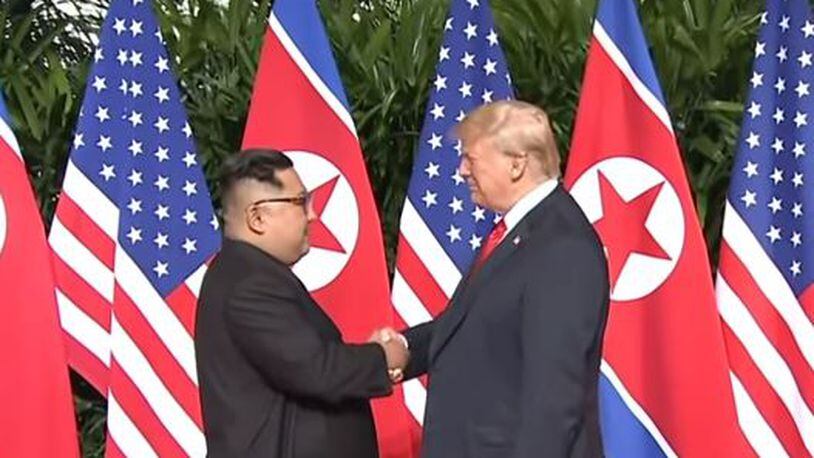"I continue to remain skeptical about Kim Jong Un’s commitment to denuclearization," said Rep. Mike Turner (R-OH).
"Following this summit I remain skeptical but hopeful that this new dialogue can translate into meaningful progress," said Sen. Rob Portman (R-OH).
"We got hollow promises, the North Koreans got legitimacy on the world stage and a compulsive assurance from President Trump that the U.S. would suspend joint military exercises with South Korea," said Rep. Tim Ryan (D-OH). "Very concerning."
"Maximum pressure is wasted when we settle for minimal results," said Sen. Tammy Duckworth (D-IL), who said Kim Jong Un had been given an agreement "without any concrete promises or plans to achieve verifiable denuclearization."
The major concern was the lack of detail on how North Korea would deal with its nuclear weapons program - here are the four points which were agreed to in the Trump-Kim statement:
But there were lawmakers who - while acknowledging the lack of details - said that it was simply time to try something different.
"The status quo has failed," said Rep. Doug Collins (R-GA).
"The traditional way hasn't worked for many, many years, so this is a non-traditional approach," said Sen. Joe Manchin (D-WV). "I'm very optimistic about it."
"North Korea must know they have no option but to change its ways," said Rep. Ted Poe (R-TX).
"I hope to see continued substantive negotiations with the goal of denuclearization and a path of peace and prosperity moving forward," said Rep. Austin Scott (R-GA).
But others said the President had given too much respect to the North Korean leader.
"Kim is a brutal dictator," said Rep. Ted Deutch (D-FL). "The President views him as a “talented man.” What happened to our values?"
While lawmakers were trying to digest what went on, Mr. Trump was flying home from Singapore; the White House said he would return to the White House on Wednesday morning. A first refueling stop occurred in Guam early on Tuesday afternoon, Washington time.
Asked by reporters aboard Air Force One how the U.S. and the world would guarantee that Kim follows through on his pledge to denuclearize, the President expressed confidence.
"We’re going to have to check it and we will check it. We’ll check It very strongly," Mr. Trump said.
"And, do you trust him?" asked a reporter.
"I do," Mr. Trump said.
Here is the full text of the agreement signed by Mr. Trump, as provided by the White House:
Joint Statement of President Donald J. Trump of the United States of America and Chairman Kim Jong Un of the Democratic People’s Republic of Korea at the Singapore Summit
President Donald J. Trump of the United States of America and Chairman Kim Jong Un of the State Affairs Commission of the Democratic People’s Republic of Korea (DPRK) held a first, historic summit in Singapore on June 12, 2018.
President Trump and Chairman Kim Jong Un conducted a comprehensive, in-depth, and sincere exchange of opinions on the issues related to the establishment of new U.S.–DPRK relations and the building of a lasting and robust peace regime on the Korean Peninsula. President Trump committed to provide security guarantees to the DPRK, and Chairman Kim Jong Un reaffirmed his firm and unwavering commitment to complete denuclearization of the Korean Peninsula.
Convinced that the establishment of new U.S.–DPRK relations will contribute to the peace and prosperity of the Korean Peninsula and of the world, and recognizing that mutual confidence building can promote the denuclearization of the Korean Peninsula, President Trump and Chairman Kim Jong Un state the following:
- The United States and the DPRK commit to establish new U.S.–DPRK relations in accordance with the desire of the peoples of the two countries for peace and prosperity.
- The United States and the DPRK will join their efforts to build a lasting and stable peace regime on the Korean Peninsula.
- Reaffirming the April 27, 2018 Panmunjom Declaration, the DPRK commits to work toward complete denuclearization of the Korean Peninsula.
- The United States and the DPRK commit to recovering POW/MIA remains, including the immediate repatriation of those already identified.
Having acknowledged that the U.S.–DPRK summit—the first in history—was an epochal event of great significance in overcoming decades of tensions and hostilities between the two countries and for the opening up of a new future, President Trump and Chairman Kim Jong Un commit to implement the stipulations in this joint statement fully and expeditiously. The United States and the DPRK commit to hold follow-on negotiations, led by the U.S. Secretary of State, Mike Pompeo, and a relevant high-level DPRK official, at the earliest possible date, to implement the outcomes of the U.S.–DPRK summit.
President Donald J. Trump of the United States of America and Chairman Kim Jong Un of the State Affairs Commission of the Democratic People’s Republic of Korea have committed to cooperate for the development of new U.S.–DPRK relations and for the promotion of peace, prosperity, and security of the Korean Peninsula and of the world.
About the Author
